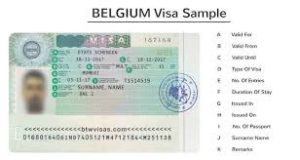Belgium Work Visa
Belgium Work Visa: Requirements, Application Process & Eligibility (2025 Guide)
Are you planning to work in Belgium? Understanding the Belgium Work Visa process is the first step toward legally working and living in this vibrant European country. Whether you’re an EU citizen or from a non-EU country, this guide breaks down everything you need to know about Belgium’s work visa types, eligibility, requirements, and how to apply in 2025.
Who Needs a Work Visa for Belgium?
-
EU/EEA and Swiss citizens do not need a visa or work permit to work in Belgium.
-
Non-EU nationals must apply for a work visa and work permit before starting employment.
Belgium Work Visa Types
1. A single permit, which combines a residence permit with a work permit.
for stays longer than ninety days. necessary for the majority of non-EU employees.
2. Temporary Work Permit
for seasonal jobs or work missions lasting up to ninety days.
3. The EU Blue Card
for highly qualified non-EU workers who have a university degree and a high-paying employment offer.
4. Permit for Intra-Corporate Transferees (ICT)
for workers from global corporations moving to a branch in Belgium.
Belgium Work Visa Requirements (2025)
To apply for a Belgium work visa, you’ll need:
-
A valid job offer or employment contract from a Belgian employer.
-
Work permit (usually applied for by the employer).
-
Valid passport (at least 12 months).
-
Medical certificate proving you are fit to work.
-
Proof of accommodation in Belgium.
-
Police clearance certificate (no criminal record).
-
Visa application form and recent passport-sized photos.
-
Payment of the visa fee (typically €180, subject to change).
Step-by-Step Belgium Work Visa Application Process
Step 1: Secure a Job in Belgium
Before applying, you must have a confirmed job offer from a Belgian employer.
Step 2: Employer Applies for a Work Permit
Your employer will request the necessary work authorization from the regional employment office (Flanders, Wallonia, or Brussels).
Step 3: Apply for the Work Visa
Once the permit is approved, apply for your work visa at the Belgian embassy or consulate in your home country.
Step 4: Travel to Belgium
Once granted, you can travel to Belgium and start working. You must register at your local town hall within 8 days of arrival.
Step 5: Obtain Your Residence Card
Receive your residence card (A card) which allows you to live and work in Belgium legally.
Processing Time for Belgium Work Visa
-
The processing time typically takes 4 to 8 weeks, depending on the visa type and region.
-
It’s advisable to start the application at least 2-3 months before your planned travel.
Belgium Work Visa for Self-Employed and Freelancers
If you’re self-employed or a freelancer, you need a professional card and must prove:
-
Relevant qualifications and business plan
-
Financial means to support yourself
-
Registration with the Crossroads Bank for Enterprises
Tips for a Successful Belgium Work Visa Application
-
Double-check document translations (must be in Dutch, French, or German).
-
Ensure your job offer meets the salary threshold (especially for EU Blue Card).
-
Maintain open communication with your employer and embassy throughout the process.
Why Work in Belgium?
-
High quality of life and strong workers’ rights
-
Central location in Europe with easy travel access
-
Diverse job opportunities in tech, finance, healthcare, and logistics
-
Competitive salaries and social security benefits
